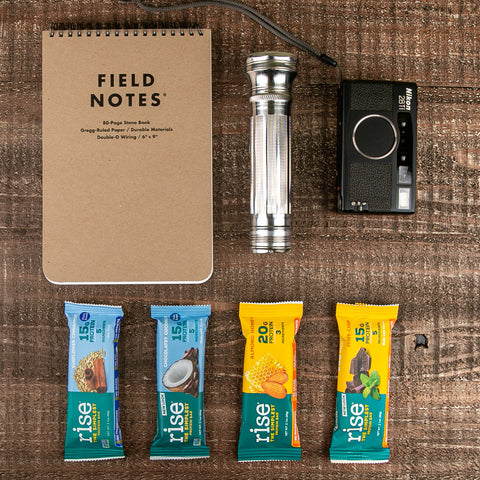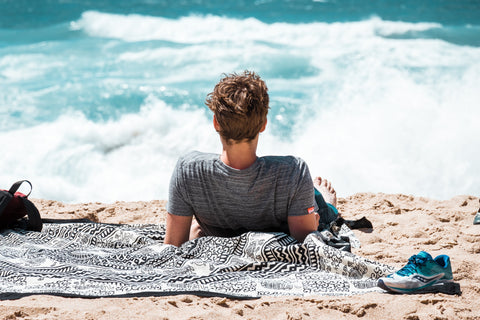Are you getting ready for your next (or first) one day hike?
Besides the day hike essentials you need just to get on the trail, you’ll also want to create a day hike packing list of necessities you may need along the way.
So this guide covers what to pack for a day hike to keep you and your family safe and ready for whatever the wilderness brings.

Day Hike Essentials To Conquer Your Next Adventure
If it’s your first time trekking, learning what to bring on a day hike may seem overwhelming. So start with these must-haves before working on the rest of your packing list:
1. A 20–35 Liter Hiking Backpack
Your backpack should be light enough to carry all day but also sturdy and roomy enough to hold everything you must bring. This size is easy to find and works well for most people.
2. Proper Hiking Shoes or Boots
Invest in a solid pair of hiking shoes. Look for a pair that’s lightweight, offers necessary grip, and dries out quickly. Some hikers prefer trail running shoes since they check all these boxes and feel more comfortable.
3. Moisture-Wicking Clothing and Socks
Avoid wearing cotton since it can take a while to dry if you’re sweaty or caught in a sunshower. Instead, stick to moisture-wicking clothing made of synthetic fibers or merino wool.
These not only dry faster but help regulate your body temperature so you’re not too hot or too cold. You should also dress in layers so you’re prepared for warmer or cooler temps along the trail.

The Ultimate One Day Hike Packing List
Use this checklist of what to pack for a day hike anytime you’re venturing off the beaten path:
1. Lightweight Rain Gear
Monitor the forecast a few days before your hike to see what kind of weather you may be up against. If everything looks clear, you should still pack lightweight rain gear -- such as a jacket or poncho -- since you never know when a quick storm could roll through.
2. Reusable Water Bottle or Water Bladder
One large water bottle is probably not enough to get you through a full one day hike, especially if you’re in the sun. So consider filling up one of those and adding a water bladder to your backpack.
You may also want to add electrolyte tabs to your water to replace what you’re losing in sweat if you’re hiking in hotter weather.
3. Snacks for On-the-Go Fuel
Pack yourself plenty of sustenance to power through your hike, plus a little extra in case you get lost, your hike takes longer than planned, or the climb makes you hungrier than usual.
Protein-packed bars, nuts, and jerky are all great snacks to carry. Make sure these are stowed away safely so you don’t attract bears or other wild, hungry animals.

4. Navigation Tools
You should always study the area you’re going to hike on a map to familiarize yourself with the terrain and the trails before you head out.
Don’t rely on your phone’s GPS capabilities because you may lose signal. Pack old-school navigation tools like a paper map and compass just to be safe.
5. First-Aid Kit for Emergencies
Never hike without a first aid kit stocked with essentials you may need should a situation come up. Look for an assembled kit full of bandages, antibiotic ointment, gauze, pain relievers, etc., or build your own.
6. A Knife or Multi-Tool
A knife or multi-tool will come in handy when you least expect it, so plan to bring one of these too.
7. Sun Protection
Sun protection in the form of sunblock, UPF clothing, sunglasses, and a wide-brimmed hat can all ensure the brutal midday sun doesn’t ruin your fun.

8. A Reliable Headlamp
On the opposite end, a headlamp will illuminate the way when the sun goes down. While you could use your phone’s flashlight, you don’t want to get stuck draining your battery and potentially losing your only form of communication.
9. Backup Batteries
Take backup batteries for your phone, camera, headlamp, etc. And make sure they’re all fully-charged before you leave home.
10. Personal Locator Beacon
A personal locator beacon is an even better safety tool than your phone since it doesn’t need a signal to work.
You never know when you’ll need it, especially if you’re on a longer trail or one you’re not used to. It’s far too easy to get turned around and lost, but a personal beacon ensures you won’t be stuck forever.

11. Hand Sanitizer
Hand sanitizer is the last must-have item on your one day hike checklist. You’ll want to use this before you eat, after the restroom, and any time your hands come in contact with foreign objects (that strange animals may have touched first).
12. A Roll of Duct Tape
Is there anything duct tape can’t fix? If you rip your backpack strap, tear a hole in your pants, or need to tie something together, duct tape is always there for the rescue.
13. Toilet Paper and a Trowel
Toilet paper and a trowel are crucial for ensuring you can safely go to the bathroom without leaving anything behind.

Now Keep this Day Hike Checklist Handy
This checklist of what to bring on a day hike includes everything you need to stay safe and comfortable on the trails. So keep this list handy when you’re gathering and packing your supplies.
When you have everything in order, it’s best to do a trial run before you actually head out. Pack your bag, put on the exact clothes you’ll wear on the hike, and walk around your neighborhood or a nearby park for 30 minutes to an hour.
You’ll learn whether your backpack is too heavy, or if everything fits as it should. You don’t want to find out an hour into your trek that your shoes and socks are too loose and causing blisters, after all.
Tackle these items, and you’ll be ready to conquer your next adventure!
Author: Devan Ciccarelli
Email: devan@behappynothangry.com
Instagram/Facebook Group: @behappynothangry/Be Happy Not Hangry
Website: www.behappynothangry.com




